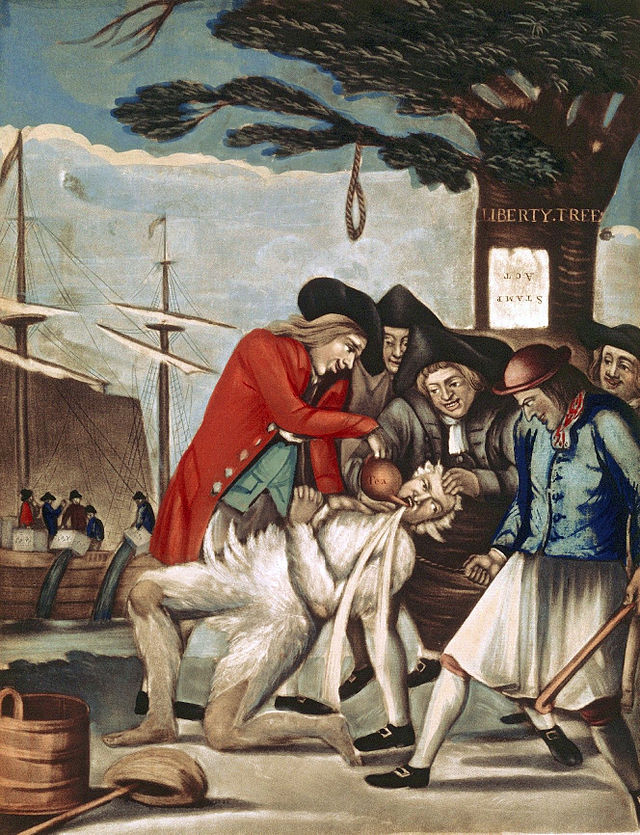Contents
Contents
What was the Tea Act?
The Tea Act was a new law implemented by the British parliament on May 10, 1773.
The new law stated that:
- The East India Company could export tea directly to the Thirteen Colonies in America, without having to import the tea into Britain first. The East India Company was a British business that traded goods around the world, such as in the East Indies, and East Asia. It had its own army and controlled certain overseas territories – it was effectively an arm of the British Empire.
- The East India Company no longer had to pay tax when sending tea from Britain to America.
The Tea Act made British tea much cheaper than other tea smuggled into America from foreign countries, such as Holland.
When this British tea was imported into America, a tax had to be paid to the British government, under the Townshend Acts. This was not the case with foreign tea, which was often smuggled into the colonies illegally.
Why was the Tea Act implemented?
- In the 1770s, the British government was in a lot of debt. During the Seven Years’ War, which lasted from 1756 to 1763, the British Army had to do a lot of fighting in far-away places, including America and India, which was very expensive. After winning the war, the British tried to raise money by taxing their American colonies, such as with the Stamp Act of 1765. The Tea Act was another new law designed to raise money, by encouraging the Americans to buy more British tea, which they would have to pay tax on.
- In response to these other new laws put in place by Great Britain, the colonists put up a huge amount of resistance, because they felt that the British had no right to tax them. For example, after the Stamp Act was passed, there were widespread protests, and people organized to stop buying British goods, to try and hurt the British financially. This led to the Stamp Act being repealed in 1766. However, the British were determined to assert their right to tax the colonies and pass new laws as they saw fit. Therefore, the Tea Act, especially the tax on tea coming into the country that the colonists had to pay, was a show of force, to demonstrate that the British were still in charge.
- In the 1770s, the British East India Company was struggling financially. The company suffered from corruption and mismanagement, and maintaining its armed forces in countries such as India was very expensive. The British thought that by removing taxes on the company, they could save it from bankruptcy. In particular, the East India Company had a huge stockpile of tea in its London warehouses. The British thought that by removing taxes on tea shipped out of the country, they could allow this tea to be sold, and save the company.
What did the Tea Act do?
The Tea Act gave the British an effective monopoly on the tea market in America. This means that they were the only seller, because their prices were so much lower than the competition.
As a result, colonial traders who purchased tea from other countries were put out of business. Also, colonists were effectively forced to begin paying the British tea tax. Many people were very opposed to this. Although the tax was not large, many felt that the British did not have the right to place taxes on the colonists without their permission. They felt that if they began paying this tax, more taxes would come in the future.
How did the colonists react?

The colonists were outraged by the Tea Act. Patriot merchants, politicians and political organizations did everything they could to avoid buying British tea, and avoid paying the tea tax.
- Widespread protests occurred, targeting the British, especially the Customs Office. On January 25, 1774, a Loyalist customs officer called John Malcolm was kidnapped by an angry mob, covered in sticky tar and bird’s feathers, and forced to drink tea.
- At some ports, British ships carrying tea were sent back to England. Other ships were left in the docks.
- On December 16, 1773, a group of Patriot rebels boarded a British ship in Boston, and dumped 342 chests of tea into the sea, valued at more than $1m in today’s money. This incident later became known as the Boston Tea Party.
Aftermath
British politicians were outraged by the colonists’ actions.
In 1774, they passed a range of new laws known as the Coercive Acts, or the Intolerable Acts in America, designed to punish the colonies for their rebellion.
Under the Coercive Acts, the Boston port was closed, until the colonists repaid the British for the tea they destroyed. The British declared that they would appoint Massachusetts government officials themselves, stripping the colony of its autonomy. Also, trials of British government officials accused of wrongdoing could be held in England, which outraged the colonists. The Quartering Act was also updated, putting more pressure on the colonial governments to provide housing and other supplies to British Army troops in America.
Ultimately, the Tea Act led to a significant increase in tension between the two sides and increased conflict, which would eventually lead to the American Revolution.
To learn more, read our full article on the Tea Act.



